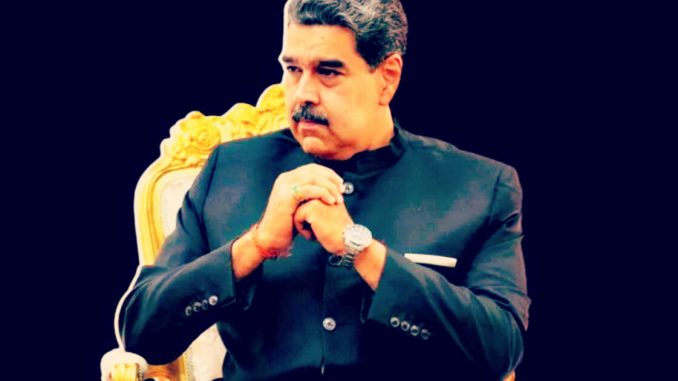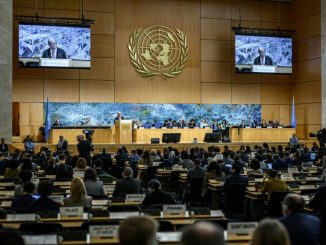
| Published August 8, 2025
U.S. Doubles Bounty on Nicolás Maduro to $50 Million in Escalating Narco-Terrorism Case
The U.S. government has dramatically increased the reward for information leading to the arrest of Venezuelan President Nicolás Maduro, raising it to a record-breaking $50 million. The move, announced jointly by the Department of Justice (DOJ) and State Department on August 7, 2025, marks one of the largest bounties ever placed on a sitting head of state. Attorney General Pam Bondi delivered the announcement in a video statement, framing the action as a decisive escalation in the fight against transnational organized crime.
The Charges Against Maduro
The charges are nothing short of explosive. U.S. prosecutors allege that Maduro has long operated as the political shield for a massive narcotics pipeline, working with criminal syndicates like Tren de Aragua and Mexico’s Sinaloa Cartel to smuggle cocaine—much of it laced with fentanyl—into the United States.
According to court filings, Maduro and senior Venezuelan officials have been under indictment since 2020 for narco-terrorism, drug trafficking, and weapons charges. The initial $15 million bounty, set during Donald Trump’s presidency, was later increased to $25 million under Joe Biden. The Trump administration—back in power in 2025—has now doubled that figure, signaling a renewed and aggressive posture toward Caracas.
Authorities say the scope of the alleged criminal enterprise is staggering: over 30 tons of cocaine have been seized, along with more than $700 million in assets, including private jets and luxury vehicles tied to Maduro’s inner circle.
Why Now?
The timing of the announcement coincides with growing frustration in Washington over Maduro’s disputed 2024 reelection, which U.S. officials and several Latin American governments have called fraudulent. Bondi emphasized that the decision was based on evidence, not politics, stating, “This is about stopping dangerous drugs from entering our communities and holding those at the very top accountable.”
Officials hope that the dramatic increase will prompt insiders—possibly from Maduro’s own government—to come forward with actionable intelligence.
 The U.S. is offering a $50 million reward for information leading to the arrest of Venezuelan President Maduro.
The U.S. is offering a $50 million reward for information leading to the arrest of Venezuelan President Maduro.
 The Trump administration says cartels are a primary source of income for the Venezeulan dictator.
The Trump administration says cartels are a primary source of income for the Venezeulan dictator.
 Implications of the $50M U.S. Reward for Nicolás Maduro
Implications of the $50M U.S. Reward for Nicolás Maduro
1. Diplomatic Fallout
-
The move will likely further isolate Venezuela internationally, especially with nations already critical of Maduro’s regime.
-
Countries aligned with or financially tied to Caracas—such as Russia, China, and Iran—may view this as an escalation and could respond with stronger political or economic support for Maduro.
2. Intensified U.S.–Venezuela Tensions
-
This sharp increase in the reward makes diplomatic dialogue even less likely in the near term.
-
Venezuela may retaliate with expulsions of U.S. diplomats, propaganda campaigns, or closer military cooperation with U.S. adversaries.
3. Domestic Pressure on Maduro
-
Inside Venezuela, political opponents may use the U.S. reward as leverage to highlight alleged corruption and narco-links.
-
However, the fear of reprisal could also discourage insiders from cooperating, unless they are already seeking exile or protection abroad.
4. Regional Security Dynamics
-
The focus on Maduro’s alleged ties to Tren de Aragua and the Sinaloa Cartel sends a message to Latin American governments that the U.S. is willing to directly target leaders accused of enabling organized crime.
-
Neighboring countries like Colombia and Brazil could face increased pressure to cooperate with U.S. intelligence gathering.
5. Legal and Criminal Precedent
-
A $50M bounty for a sitting head of state is extremely rare and sets a high-profile precedent in U.S. counter-narcotics and anti-terrorism policy.
-
May embolden future administrations to take similar steps against leaders accused of transnational crimes.
6. Potential Risks
-
Could harden Maduro’s security measures, making capture less likely in the short term.
-
Increases the danger for those inside Venezuela who might consider assisting U.S. authorities.
-
Raises the stakes for covert operations, possibly inviting retaliatory attacks against U.S. personnel or allies.
 Overall Takeaway:
Overall Takeaway:
The U.S. government’s decision to raise the reward for Nicolás Maduro’s arrest to $50 million is more than a law enforcement action—it is a calculated geopolitical signal. By directly targeting a sitting head of state accused of narco-terrorism, Washington is elevating the confrontation with Caracas to one of the most aggressive levels in modern hemispheric politics.
This unprecedented bounty sends a clear warning to other leaders engaged in criminal alliances: political power does not grant immunity from international justice. However, it also risks deepening Venezuela’s isolation, escalating tensions with U.S. rivals, and making any peaceful resolution even more remote. Whether this move accelerates Maduro’s downfall or entrenches his grip on power will depend on how regional actors, insiders within his regime, and the global community choose to respond in the coming months.





Be the first to comment